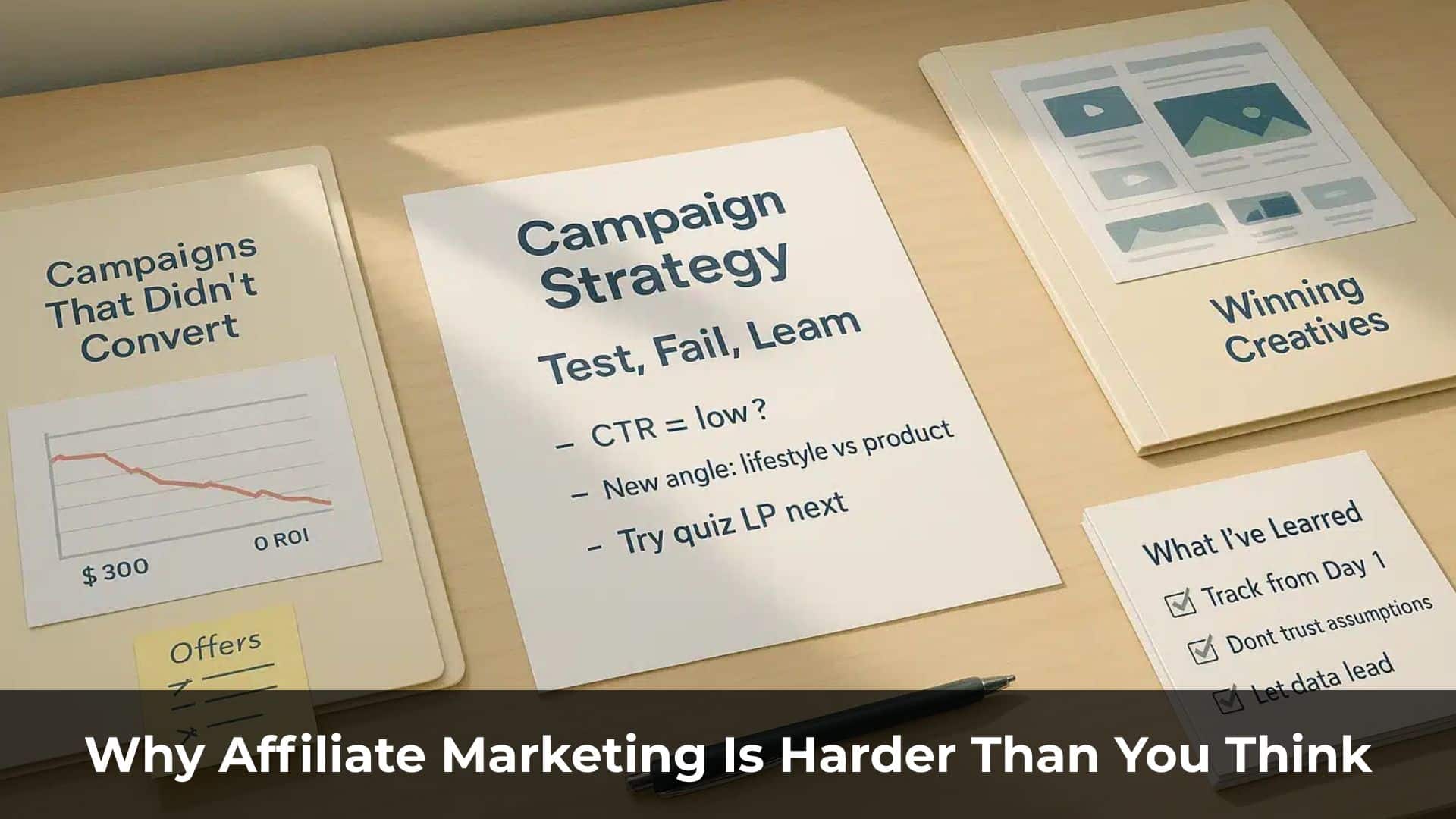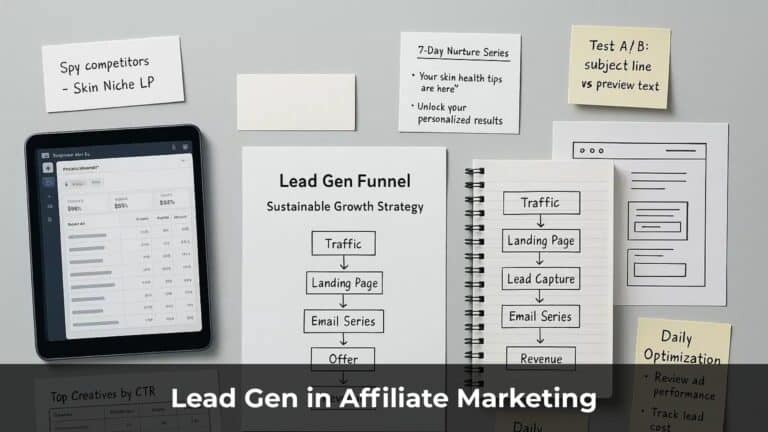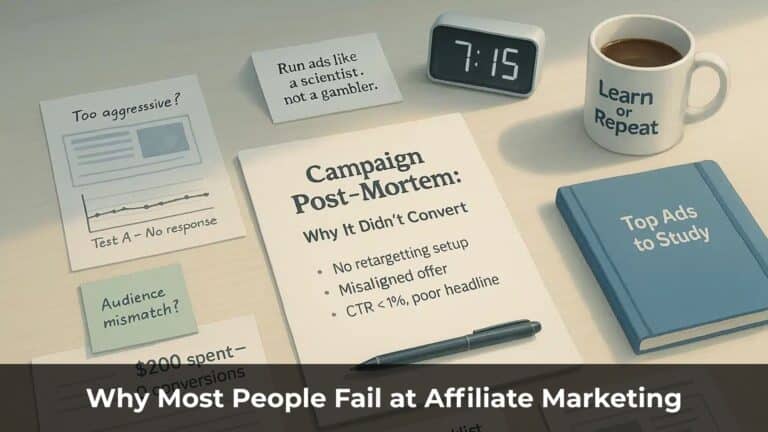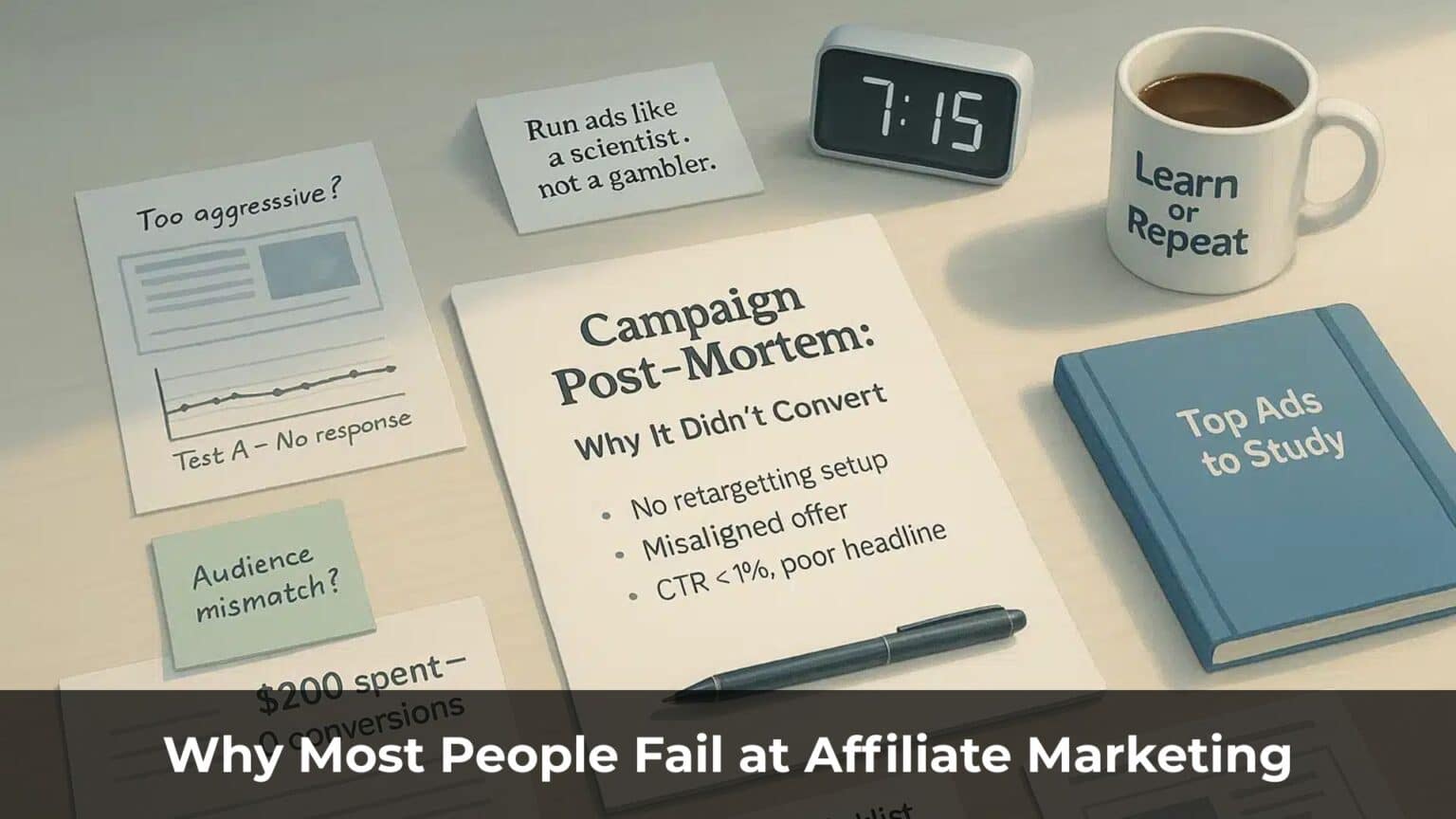I’ve always been fascinated by the idea of “hacking” — finding smarter ways to make life easier.
If you ask me, “learning how to learn” is probably the most important skill anyone can develop.
Affiliate marketing has been one of the hardest things I’ve ever had to learn.
I found success within my first year, but even today, it still demands my full effort and dedication.
Maybe you’re here because you want to learn affiliate marketing too. But once you get started, you’ll quickly realize it’s much tougher than it sounds.
In this post, I’ll break down why affiliate marketing is so challenging.
This isn’t meant to scare you off — I want you to clearly understand what you’re getting into before you dive all in.
Table of Contents
ToggleAffiliate Marketing – A Mysterious Industry
If you want to learn how to play poker, there’s no shortage of resources.
You can buy books, enroll in courses, browse websites, watch YouTube tutorials, or even hire a professional coach.
While you might not find a perfect step-by-step guide, the abundance of experts out there guarantees that with enough practice, you’ll get good at it.
The same goes for chess, or almost any other skill. Information is everywhere — all you need is practice.

But affiliate marketing? It’s a different story.
Sure, the internet is flooded with articles, videos, and tutorials about affiliate marketing.
The problem is, most of them only scratch the surface.
How many truly share in-depth strategies? How many actually teach you how to make money?
It’s fascinating: there are thousands of affiliates out there, yet only a handful of bloggers actively share their knowledge — and even then, the information is often limited.
Even I can’t share everything I know (I still need to make a living, after all).
When you first get into affiliate marketing, you’ll likely find yourself reading blogs, browsing websites, lurking on forums, and asking around on Facebook.
But here’s the catch:
Be careful with what you read online — because context matters.
One person might recommend raising your ad prices to improve results, while another swears by lowering them.
They’re both sharing what worked for their campaigns.
But without seeing the exact details of their setup, there’s no guarantee it’ll work for you.
One of the best moves you can make is finding a mentor to help guide you through all the noise.
That’s why I always encourage you to seek out local affiliates or attend conferences.
When you sit down and talk in person, you’ll often learn a lot more than you ever could online.

Learning Affiliate Marketing Is Like Exploring the Unknown
The way we were taught to learn in school usually looked something like this:
- You read and reread a chapter from a textbook.
- You try to memorize the key points.
- You take a test to see how much you remember.
And if you scored an A, people said it was because you were smart and had great thinking skills.
Well… not exactly.
You got an A because you were good at memorizing facts — that’s how the school system trains us.

Unfortunately, real life doesn’t work that way.
Life isn’t about memorization. Life is about constant exploration.
So when people jump into affiliate marketing, their first instinct is to search for a detailed, step-by-step formula.
They want a teacher to appear, hold their hand, and tell them exactly what to do.
That’s how we were conditioned to learn.
You’ll often see people searching for terms like: “step-by-step affiliate marketing guide,”
But here’s the truth:
There is no step-by-step guide.
Learning affiliate marketing is more like becoming a researcher.
You have to run experiments, test campaigns, try and fail — and above all, discover things on your own.
You launch ads, you test strategies, and over time…
You start learning by doing.
No one will hand you a perfect blueprint.
You have to dig for clues, test hypotheses, and figure out what works for your situation.
And if you want access to high-quality knowledge, you’ll usually have to pay for it — often through expensive courses.
But even then, there’s a catch.
Sometimes, you might end up spending a lot of money on a course, only to find out it’s full of generic, surface-level information.
And because people often don’t want to make a fuss or admit they made a bad investment, they stay quiet — even after realizing the course wasn’t worth it.

A Brutal Battle from Day One
Imagine your very first day learning how to box.
You’re excited. You show up for your first training session.
And who’s your first opponent?
Mike Tyson!
(Yeah, that’s not going to happen.)
In reality, you would start slow. You’d train, practice the basics, and when it’s time for sparring, you’d be matched against someone at your skill level.
After years — maybe even decades — of working with great coaches, then you might compete at a professional level.
But affiliate marketing? It’s not built like that.
From day one, you’re thrown straight into the deep end.
If you’re running Facebook ads, you’re immediately competing against everyone — including me, seasoned affiliates, massive brands with million-dollar budgets, and countless others who have no problem outspending you.
And yes, you’re also competing against other newbies — but that doesn’t necessarily make it easier.
Let’s say you’re targeting women aged 24–35 on Facebook.
You could be going head-to-head with a major restaurant chain pouring millions into brand awareness campaigns.
Or maybe you’re competing against a professional affiliate with 12 years of experience — someone running a campaign that’s quietly pulling in a 120% ROI.
This can be good or bad:
You might outperform some beginners, but don’t be surprised if you also get crushed by others who are far more experienced.

In Affiliate Marketing, the Cost of Failure Is High
In most fields, the formula for success is simple: put in enough time and effort, and you’ll eventually get good at it.
- Play chess often enough, and you’ll become a strong player.
- Practice the piano consistently, and you’ll become a skilled musician.
- Work hard at your craft, and your skills will naturally improve over time.
But affiliate marketing doesn’t follow that simple formula.
Here, you’re not just paying with time and effort — you’re constantly investing real money.
You need money to run ads.
You need money to test products, experiment with campaigns, and try different creatives.
And every time a campaign fails, you’re not just losing time — you’re burning through hard cash.
Affiliate marketing is a game where the price of failure is always steep.
Hard work alone isn’t enough.
You need strategy.
You need skill.
You need sharp instincts — and most importantly, you need smart financial management.

Because money isn’t an unlimited resource.
Traffic isn’t free.
Tools, hosting, domains — they all cost money.
You can’t just run unlimited campaigns and hope something sticks.
If I spend four hours taking a piano lesson, the cost is simply four hours of time I could’ve spent playing video games.
But when I was still a newbie in affiliate marketing, I once lost $1,000 on a single campaign.
It stung. Hard.
I couldn’t stop thinking about all the things I could have bought with that $1,000.
The psychological pressure started to mount.
Losing money in affiliate marketing doesn’t just hurt your bank account — it hits you emotionally, too.
In most fields, when you fail, you feel discouraged — but you can see steady, tangible progress over time.
In martial arts, for example, if you train consistently, you’ll improve:
- Your punches get stronger.
- Your reflexes get sharper.
- Your techniques become cleaner.
Even if you start slow, as long as you keep showing up, progress is inevitable.
But in affiliate marketing, it’s a different beast.
Every failure costs you not just money, but mental stability.
You’ll find yourself haunted by questions like:
- “Is it too late to make money online?”
- “Maybe I should just quit and get a regular job?”
- “Am I just throwing money away at this point?”
Those doubts will swirl in your mind — especially when you haven’t seen any results yet.
This is the dark side of affiliate marketing that few people talk about.
The True Cost of Failing at Affiliate Marketing
When you fail in affiliate marketing, the price you pay isn’t small.
- You lose money on ads.
- You lose time optimizing campaigns.
- You lose the hope that had just started to spark inside you.
But eventually, you’ll realize: it’s not really a loss — it’s an investment in your future.
Every dollar you “lose” while testing ads is actually money spent buying data and learning lessons no school could ever teach you.
You might wonder, “Is it too late to make money online?”
But the truth is, thousands of people out there are still succeeding.
They have the same 24 hours in a day as you do.
If they can do it, so can you.
There were times when I compared myself to people with steady 9-to-5 jobs — sitting comfortably in offices, collecting regular paychecks.
Their lives seemed so much easier.
But then I realized something: Affiliate marketing gives me freedom.
It gives me control over my life’s direction — and that is the ultimate reward.
You may fear losing money when running affiliate campaigns.
But even in the worst-case scenario — even if you lose all the money you invested — you can always rebuild.
- You can find another job.
- You can stand up and start again.
And the skills you’re building — media buying, internet marketing, campaign management — are incredibly valuable.
These skills are in high demand, and they’ll stay with you for life.
Every lesson you learn today, no matter how costly, is laying the foundation for your future.
That’s the real price you pay to become the master of your own destiny.

Affiliate Marketing Is Constantly Changing
In this industry, everything is in a constant state of change.
The tactics that brought success just a few months ago might be completely useless today — because new methods are always emerging.
That’s the nature of affiliate marketing.
Strategies keep evolving.
What worked for you last year might not work at all today.
Back in 2011, everyone was running dating ads on TrafficJunky and ExoClick.
Today, trying the same thing would be much tougher.
Five years ago, running native ads was far easier than it is now.
I’m not saying it’s impossible to profit today — I’m saying it’s a lot harder.
And that’s one of the biggest challenges when you’re new:
You often don’t know whether the skills you’re learning are still relevant — or already outdated.
That’s why I always recommend using spy tools to study the competition.
But to be clear: Don’t use spy tools just to copy someone else’s landing page.
Use them to make sure you’re heading in the right direction — to stay aligned with what’s working right now.
Affiliate Marketers Must Navigate Countless Variables
One thing I’ve learned from playing cards is that the best players don’t always win.
There are simply too many variables at play.
You could play every hand perfectly, exactly by the book — and still lose.
You can’t control which cards you’re dealt, and you certainly can’t predict how others will react.
The same is true in affiliate marketing: there are countless moving parts.
1. Some Campaigns Simply Aren’t Profitable
If the offer itself is low quality, the entire campaign will collapse.
No clever angle, no brilliant landing page can save it.
That’s why it’s smart to base your campaigns on what’s already working (by using spy tools).
At the very least, you know you’re building on something with real potential.
Once you identify successful campaigns, your job is to redesign and improve on them.
2. Sometimes You Do Everything Right — and Still Lose
Imagine playing a simple card game.
You’re dealt a 7 and a 2 — and somehow, that’s enough to win.
No matter how skillfully I play my hand, I’m still going to lose that round.
And yet, even after losing, I should stick to the proven strategy — because over time, skill and good decision-making win out.
Affiliate marketing works much the same way.
You could have killer ad creatives, a flawless landing page… and still struggle.
- Maybe the traffic you’re getting isn’t the right audience.
- Maybe the sites you’re advertising on start sending bot traffic.
- Maybe the offer itself has issues — like a broken checkout page — leading to poor conversions.
Competition is fierce. Problems arise constantly.
And your job is simple:
Stay patient.
Keep playing smart.
And when the right moment comes — play your ace.
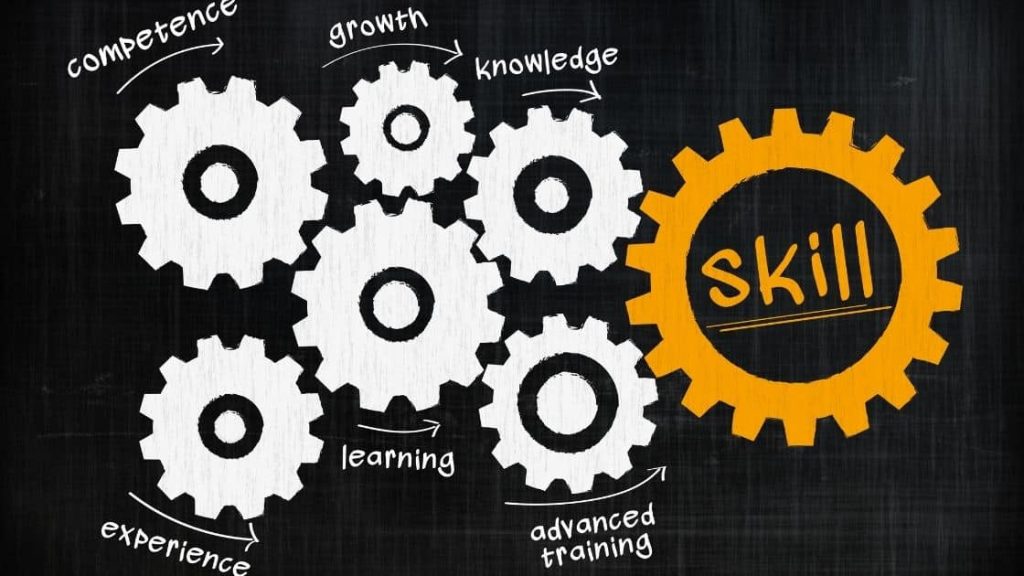
You Need to Master a Range of Skills
To succeed in affiliate marketing, you’ll need to develop a wide range of skills.
- Writing
- Problem-solving
- Data analysis and campaign management
- Tech skills
- Leadership skills
- …
You might be a fantastic blogger, but struggle when it comes to analyzing ad campaign data.
Or maybe you’re a talented coder — but lack strong communication or leadership skills.
And without leadership ability, you’ll find it hard to build and manage a team.
But don’t stress too much — these are all skills you can learn over time.
What matters most is staying proactive and working to fill in the gaps.
I’ve seen many people who excel in one area, but they hit a ceiling because they never take the time to round out the rest.

Affiliate Marketing Is Hard — but the Rewards Are Huge
I’m not writing this to scare you.
The risks are high — but so are the rewards.
One of the most important things you can ever build is skill.
Become an expert.
On average, it takes five years to earn a black belt in Karate.
Olympic athletes train their entire lives for a few brief moments of glory.
Restaurants often spend years operating at a loss before they finally turn a profit.
It can take a decade — and over $300,000 in tuition — to become a doctor.
Becoming an expert in anything takes time.
Some people say, “I wish I had started affiliate marketing back in 2014 — it was so much easier to make money online then.”
But time machines only exist in science fiction.
What matters is what you do right now.
By 2030, a whole new generation of affiliates will look back and wish they had started in 2025 — which is exactly where you are today.
If you want success, there’s only one choice:
Move forward.
